九年级英语专题复习十五
2023年中考英语(人教版)一轮大单元复习课件九年级 第15课时 Units 1~2

【考点自测】
3.(2022·河北廊坊一模)—It is very cold outside, dear. You have to _A__your warm jacket.
—OK. I will, Mom. A.put on
B.put off
C.take off
D.take on
treat的用法 【教材原句】 He is mean and only thinks about himself. He doesn't treat others nicely. 他十分吝啬,只想着自己。他对待其他人也不友善。(九P14) 【图解考点】
【表解考点】
单词 dead die death dying
含义及用法
形容词,意为“死的;失去生命的”,用来作表语或定语, 可与时间段连用
不及物动词,是非延续性动词,可与时间段+ago连用 名词,意为“死;死亡”
die的ing形式,也可用作形容词,表示“垂死的 The dying captain looked at his dead soldiers and said, “When we die for the people, it is a worthy death.”那位奄奄一息的上尉看着他死去的士兵说: “我们为人民而死,死得其所。”
九年级 第15课时 Units 1~2
treat(教材含义)n.款待;招待 v.招待;请(客)→(拓展含义)A.v.治疗, 医治;(用特别的物质或某种化学过程)处理 B.v.把……看作, 把……视为
The pet dog is warm and loving. It is treated as a daughter of my family.(2014·河北中考·单项选择)_B__ It will be also easier for doctors to treat patients remotely by 5G._A__
2023年冀教版中考英语一轮复习 第十五课时 九年级(Unit 5_Unit 6)课件

almost block out the sky.And you can hear their wings beating.
The butterflies usually spend two months reaching Mexico.After five months of
stay,they head back north in spring.But not one butterfly finishes the whole round-
B.playing;plays
C.playing;is playing ( A )2.(2022·辽宁盘锦)The little boy won’t go to sleep unless his
mum
him a story.
A.tells C.is telling
B.told D.will tell
year are born in early autumn.But the butterflies hardly rest before starting the long
journey south again to Mexico.The most amazing thing about these monarch
5.I have repeated the sentence three times,but he still doesn’t understand it.
五、书面表达(2022·四川乐山)(10分) 在中国共产主义青年团成立100周年之际,你校将开展“如何成为一名优秀学生”
的征文活动。为此,请你给校报英语专栏写一篇短文,并倡议更多的同学入团。 内容包括: 1.爱国爱家,了解团史; 2.与人和睦相处,乐于助人; 3.努力学习,养成良好习惯; 4.锻炼身体,保持健康。
九年级英语第一轮复习资料Unit15Book9
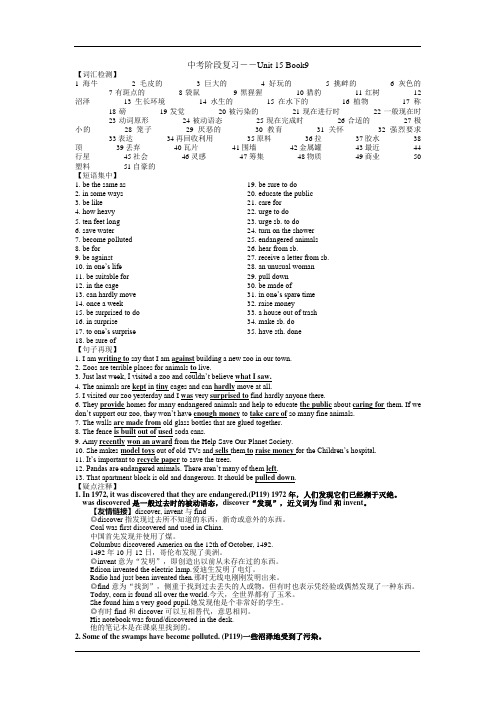
中考阶段复习――Unit 15 Book9【词汇检测】1海牛_________2毛皮的_________3巨大的_________4好玩的_________5挑衅的_________6灰色的_________7有斑点的_________8袋鼠_________9黑猩猩_________10猎豹_________11红树_________12沼泽_________13生长环境_________14水生的_________15在水下的_________16植物_________17称_________18磅_________19发觉_________20被污染的_________21现在进行时_________22一般现在时_________23动词原形_________24被动语态_________25现在完成时_________26合适的_________27极小的_________28笼子_________29厌恶的_________30教育_________31关怀_________32强烈要求_________33表达_________34再回收利用_________35原料_________36拉_________37胶水_________38顶_________39丢弃_________40瓦片_________41围墙_________42金属罐_________43最近_________44行星_________45社会_________46灵感_________47筹集_________48物质_________49商业_________50塑料_________51自豪的_________【短语集中】1. be the same as2. in some ways3. be like4. how heavy5. ten feet long6. save water7. become polluted8. be for9. be against10. in one’s life11. be suitable for12. in the cage13. can hardly move14. once a week15. be surprised to do16. in surprise17. to one’s surprise18. be sure of 19. be sure to do20. educate the public21. care for22. urge to do23. urge sb. to do24. turn on the shower25. endangered animals26. hear from sb.27. receive a letter from sb.28. an unusual woman29. pull down30. be made of31. in one’s spare ti me32. raise money33. a house out of trash34. make sb. do35. have sth. done【句子再现】1. I am writing to say that I am against building a new zoo in our town.2. Zoos are terrible places for animals to live.3. Just last week, I visited a zoo and couldn’t believe what I saw.4. The animals are kept in tiny cages and can hardly move at all.5. I visited our zoo yesterday and I was very surprised to find hardly anyone there.6. They provide homes for many endangered animals and help to educate the public about caring for them. If we don’t support our zoo, they won’t have enough money to take care of so many fine animals.7. The walls are made from old glass bottles that are glued together.8. The fence is built out of used soda cans.9. Amy recently won an award from the Help Save Our Planet Society.10. She makes model toys out of old TVs and sells them to raise money for the Children’s hospital.11. It’s important to recycle paper to save the trees.12. Pandas are endangered animals. There aren’t many of th em left.13. That apartment block is old and dangerous. It should be pulled down.【疑点注释】1. In 1972, it was discovered that they are endangered.(P119) 1972年,人们发现它们已经濒于灭绝。
期中Units15作文复习人教版九年级英语全册
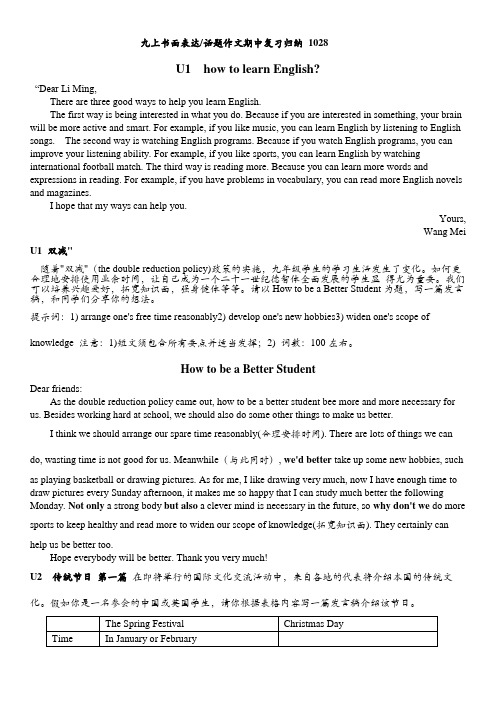
九上书面表达/话题作文期中复习归纳1028U1 how to learn English?“Dear Li Ming,There are three good ways to help you learn English.The first way is being interested in what you do. Because if you are interested in something, your brain will be more active and smart. For example, if you like music, you can learn English by listening to English songs. The second way is watching English programs. Because if you watch English programs, you can improve your listening ability. For example, if you like sports, you can learn English by watching international football match. The third way is reading more. Because you can learn more words and expressions in reading. For example, if you have problems in vocabulary, you can read more English novels and magazines.I hope that my ways can help you.Yours,Wang Mei U1 双减"随着"双减"(the double reduction policy)政策的实施,九年级学生的学习生活发生了变化。
九年级英语Unit11-Unit15复习教案 人教新目标版

九年级英语Unit11-Unit15复习教案The First PeriodⅠ. Teaching Aims and Demands1. Knowledge ObjectsKey vocabulary that students have learned in Units 11~15.2. Ability ObjectsTrain students’ ability to use the target language they have learned freely and creatively.3. Moral ObjectRepetition is the mother of learning.Ⅱ. Teaching Key PointKey vocabularyⅢ. Teaching difficult PointTrain students’ ability to use the target language they have learned freely and creatively.Ⅳ. Teaching MethodPractice methodⅤ. Teaching AidThe blackboardⅥ. Teaching ProceduresStep I RevisionCheck homework. Ask five students to read their sentences one by one using the words in activity 1 in preceding class.Help correct the mistakes made in their sentences.Step Ⅱ 1aThis activity reviews some of the vocabulary that students have learned in Go For It Book 5.In this activity, we’ll reviens some of the vocabulary in Units 1~15 by completing a crossword. Now, look at the clues with the headingsDown and Across.Draw students’ attention to the crossword. Read the sample answer to the class: I can look out of the window in my apartment. Make sure that they understand what they need to do. Then say,Please read the clues and complete the crossword. Get students to do the crossword in pairs. While they are working, move around the classroom to make sure that allthe students know what to do, offering help if necessary.Cheek the answers by asking different students to read out and spell the answers.AnswersDown 1. windows 2. bought 3. is 5. elephant 6. wrong 7. suitcase 8. award 12. made 15. scarf 16. jobs 18. rude 19. meet 20. orAcross 1. walls 4. noodles 7. strong 8. are 9. on 10. trash 11. sit 13. had 14. done 17. customer 21. ever 22. fast 23. cheetahStep Ⅲ 1bThis activity requires students to creatively use the language they have learned.Go through the instructions with the class. Invite a pair of students to read the sample conversation.S A: This is a place where we can go to see animals.S B: Is it a zoo?S A: Yes, it is.Make sure students understand what they need to do. Ask students to choose four words from Units 11~15 and write a clue for each word. Have students do the activity in pairs. When they work, move around the classroom listening and offering help where necessary.Ask four students to say their clues and have the class guess the words.S1: It is useful and helpful to us and can bring us success in competition.(advantage)S2: This is a person who owns something.(owner)S3: This is a metal container in which food is kept cold.(refrigerator)S4: This is a large sea animal. We also call it sea cow.(manatee)Step Ⅳ SummaryIn this class, we’ve reviewed some of the vocabulary words in Units 1~15.Step Ⅴ HomeworkReview the vocabulary words in Units 11~15Step Ⅵ Blackboard DesignReview of units 11~15The Second PeriodⅠ. Teaching Aims and Demands1. Knowledge Objects(1) Listening practice using the target language.(2) Oral practice using the target language.2. Ability Objects(1) Train students’ listening skill.(2) Train students’ speaking skill.3. Moral ObjectIf you review what you have learned actively, you will make greater progress.Ⅱ. Teaching Key Points1. Listening practice using the target language.2. Oral practice using the target language.Ⅲ. Teaching Difficult PointTrain students’ listening skill.Ⅳ. Teaching Methods1. Listening method to improve students’ listening ability.2. Pairwork to make every student work in class.Ⅴ. Teaching AidA tape recorderⅥ. Teaching ProceduresStep Ⅰ RevisionDictate some vocabulary words in Units 11~15.guidebook, member, advantage, manatee, environment, greet, bow, wipe, serve, miss, fresh, rude, endangered, useful, strong, tiny, politely, mostly, gradually, speciallyChoose five words. Encourage students to make sentences with them.S1: Everyone has more advantages than disadvantages.S2: Manatees are large sea animals.S3: Let’s go out for some fresh air.S4: He was late for school because he missed the bus.S5: The ant is a tiny insect.Step Ⅱ 2aThis activity provides practice in listening for the general idea.focus attention on the four pictures.Say, You are going to listen to four conversations. Match the conversations with the correct pictures. Point to the sample answer. Say, This picture matches the first conversation you will hear.Play the recording for the first time.Students only listen.Play the recording a second time.This time students listen and match the conversations with the correct pictures by writing the numbers in the boxes.Check the answers.Answers(from top to bottom)1,4,2,3TapescriptConversation 1Cbu: Tom, I have some questions about your country, Canada.Tom: Okay. What do you want to know?Cbu: What are you supposed to do when you meet someone for the first time? Tom: You’re supposed to shake hands.Cbu: How about time? For example, when a party is at eight o’clock, do you go at eight o’clock?Torn: No, you can go about fifteen minutes late.Cbu: OK. Is it the same for business meetings?Tom: Oh no. For a business meeting make sure you’re on time.Cbu: Mm. I heard that it’s rude to make sounds when you eat. Is that true? Tom: Yes. it is. You shouldn’t do it.Cbu: One more question. Are you supposed to take a gift when you visit someone? Tom: Yes, it’s polite to take a few flowers.Cbu: Thanks. Now I’m ready.Conversation 2Ben: Excuse me, could you tell me where the doctor’s office is?Sue: Yes, it’s on the second floor, beside the escalator.Ben: Mm. First I need to buy a book. Is there a book store around here? Sue: Sure. You can find Biblo Books on the fourth floor. Take the elevator.Ben: Oh, I also need to exchange some money.Sue: Yes. There’s a bank on the first floor. It’s right behind you.Ben: Good. I think that’s everything. Oh no. There’s one more place I need to go.Sue: Yes?Ben: Do you know where I can buy some shampoo?Sue: Yes, there’s a drugstore on the third floor. Take the elevator.Ben: Thank you. You’ve been very helpful.Sue: You’re welcome.Conversation 3Mom: We have to leave in half an hour. Is everything ready for the trip?Xiao Li: I don’t know.Mom: Well, have you packed the travel guidebook?Xiao Li: Yes. I did. Oh! But I forgot the map.Mom: OK. Pack the map. What about the camera?Xiao Li: Yes. I have the camera.Mom: What’s that noise? Have you turned off your radio?Xiao Li: No, I’ll do it now.Mom: And the towels. Have you packed the towels yet?Xiao Li: Yes. I packed the towels.Mom: What about the food? Did you pack the food?Xiao Li: Yes. I’ve packed it already.Morn: Well, I think we’ve almost ready!Conversation 4Henry: Hi, Janet. Would you like to help save the environment?Janet: I don’t know. What can I do?Henry: Well, first, you can start by turning off the lights.Janet: Yes. That’s easy. Sometimes I turn on the lights without thinking.What’s next?Henry: Second, you can ride a bicycle.Don’t take a bus or a taxi if you don’t have to.Janet: That will save money, too. What else?Henry: Thrid, try to recycle paper.Janet: Mm. Newspapers, magazines, mail …we get a lot of paper at home. Good idea.Henry: The fourth idea is turning off the shower When you’re not using it.Janet: You mean, when I have shampoo in my hair?Henry: Yes. Get wet. Turning off the shower. Put in the shampoo in your hair and then turn on the shower and wash it out.Janet: Will that help the environment?Henry: Yes. We have to save water. And fifth, take a bag when you go shopping. Don’t use plastic bags.Janet: OK. My parents do most of the shopping. I’ll tell them.Step Ⅲ 2bThis activity requires students to listen for specific information in the dialogues.Look at the four different questions types next to the pictures in Activity 2a. Give students two minutes to go through the list of questions. You are going to listen to the same recording again. This time you need to listen for specific information in the dialogues that will help you answer the questions. Point out the sample answers.Play the recording for students to answer the questions. Play the recording a second time or a third time if necessary.Have students do the activity in pairs.When they work, walk around the classroom listing and offering help where necessary.Ask several students to share their answers.AnswersFTFFT53214doctor’s office--second floor;bookstore--fourth floor;bank--first floor; drugstore--third floor√pack the guidebook; × pack the map;√pack the camera;× Turn off the radio;√pack the towels;√pack the foodStep Ⅳ 2cThis activity lets students work in pairs to practise the conversations they have just heard.Go through the instructions with the class, sample conversation in the box. Invite a pair of students to read it to the class.S A: Would you like to help save the environment?S B: I don’t know. What can I do?Write the sample conversation on the blackboard.Now work with a partner. Start by reading the sample conversation in the box with your partner. Then make conversations using information in Activity 2a.Get students to practise their conversations. As they work, walk around the classroom offering help and encouragement.Ask several pairs of students to say their conversations to the class.For example:S A: Would you like to help save the environment?S B: I don’t know. What can I do?S A: You can turn off the shower while you are washing your hair.S B: When I have shampoo in my hair?S A: Yes.Step Ⅴ SummaryIn this class, we’ve done a lot of listening and oral practice Using the target language.Step Ⅵ HomeworkAsk students to write three conversations in Activity 2c in their exercise books.Step Ⅶ Blackboard DesignReview of Units 11~15The Third PeriodⅠ. Teaching Aims and Demands1. Knowledge ObjectsOral practice using the structures Supposed to, It makes me…and Present perfect with already and yet.2. Ability Objects(1) Train students’ speaking skill.(2) Train students’ writing skill.3. Moral ObjectExpress your own opinions freely and correctly.Ⅱ. Teaching Key Points1. Supposed to2. It makes me…3. Present perfect with already and yet.Ⅲ. Teaching Difficult PointTrain students’ speaking and writing skills.Ⅳ. Teaching Methods1. Practice method2. PairworkⅤ. Teaching AidThe blackboardⅥ. Teaching ProceduresStep I RevisionCheck homework. Invite several students to say their conversations to the class.Check any errors and correct them.Step Ⅱ Part 3This activity provides writing and speaking practice using the target language.Go through the instructions with the class. Look at the sample conversation in the box. Invite a pair of students to read it aloud to the class.A: What are you supposed to do when you meet a new person in the USA?B: You’re supposed to shake hands.A: In China, you’re supposed to…Write the conversation on the blackboard.Look at the list of questions. Get a student to read the questions to the class.Please write your answers to these questions. Ask students to finish the task on their own.The answers may vary. For example:A: What are supposed to do when you meet someone in China?B: You are supposed to bow to the person/say Hi to the person/shake hands with the person.Ask students to fill in their answers, then discuss with a partner. While they are working, move around the classroom listening to different pairs and offering help as needed.Ask several pairs to share their activities.Step Ⅲ Part 4This activity lets students work in pairs to practice writing and speaking skills.Go through the instructions with the class.Look at the sample conversation in the box.Invite a pair of students to read it aloud to the class as a model.S A: How do you feel when you see the national flag of China?S B: It makes me feel proud. How about you?S A: It makes me proud, too. I think of famous Chinese men and women.Write the conversation on the blackboard.Review the different feelings in different situations students have learned.(happy, angry, sleepy, sad, relaxed, tense, etc)Ask students to give their feelings for each of the five items. Say, Please work in pairs.Make conversations to talk about your feelings in different situations. For each item, students should think of a reason for their answer. As they work, move around the classroom listening and offering help as needed.Ask several pairs of students to say their conversations to the class. Answers will vary.Step Ⅳ Part 5This activity provides practice to train students’ writing and speaking skills.Look at the instructions. Let a student to read it aloud to the class. Read the sample answer history project to the class.Say, Please make a list of the things you plan to do this month. Ask students to complete the task individually.Point to the sample conversation in the box. Invite a pair of students to read it to the class.S A: I have to do my history project this week.S B: Really? I’ve already done my history project.Write the conversation on the blackboard.Get students to think of things they need to do today. Ask them to say whether or not they have already done each thing.Ask students to write a list of five things to do this month.Please compare your list with your partner’s. Discuss what you have or have not already done.Ask several pairs to share their discussions with the class. Answers will vary.Step Ⅴ SummaryIn this class, we’ve reviewed the structures Supposed to, It makes me…and Presentperfect with already and yet by writing and oral practice.Step Ⅵ HomeworkAsk students to write two sentences for each structure in their exercise books.Step Ⅶ Blackboard DesignReview of Units 11~15The Fourth PeriodⅠ. Teaching Aims and Demands1. Knowledge Objects(1) Practise talking about hobbies.(2) Practise asking for information politely.(3) Practise using I think/believe/feel that…and I agree/disagree with you.2. Ability Objects(1)Train students’ speaking ability.(2)Train students’ writing ability.3. Moral ObjectsPractice makes perfect.Ⅱ. Teaching Key Points1. Talk about hobbies.2. Ask for information politely.3. I think/believe/feel that…and I agree/disagree with you.Ⅲ. Teaching Difficult PointsTrain students’ speaking and writing skills.Ⅳ. Teaching methods1. Pairwork2. Practice methodⅤ. Teaching AidThe blackboardⅥ. Teaching ProceduresStep Ⅰ RevisionCheck homework.Ask students to exchange their homework exercise with a partner. Help correct each other’s mistakes. Then get different students to say their sentences to the class.S1: We’re supposed to do our homework on time.S2: Pop music makes me happy.S3: Have you cleaned your room yet?S4: Yes. I have already cleaned my room.Step Ⅱ Part 6This activity provides writing and oral practice using the target language. Go through the instructions with the class.Look at the sample conversation in the box. Invite a pair of students to read it to the class.S A: What kind of museums do you like?S B: I like history museums. They’re interesting.S A: Really? I prefer science museums.Write the conversation on the blackboard.Draw students’ attention to the chart.Ask students to read the questions.Please write down your own answers in the first column in the chart. Get students to complete the task individually. Then ask students to interview two classmates about what they like and write their answers in the second and the third columns in the chart.Get students to complete the task in groups if three. As the groups work together, walk around the classroom to make sure all the students know how to fill in the blanks and offer language support as needed.Get different students to report their results like this:S A: What kind of sports do you like?S B: I like football. It is very exciting.S A: Really? I prefer basketball.Answers will vary.Step Ⅲ Part 7This activity lets students work in pairs to practise writing and speaking skills.Go through the instructions with the class.Look at the sample conversation in the box.Invite a pair of students to read it to the class.S A: Excuse me. Can you help me?S B: Yes, certainly. How can I help you?S A: Can you tell me if there are any good museums in the city?S B: There are many good museums. Do you like art?S A: Yes. I like it very much.Write the conversation on the blackboard.Ask a few students about museums, food, transportation and costs. Then write questions using the four sentences as guides.Please make conversations using the questions. Then ask students to role play conversations with their partners using their questions.Have some students share their answers as dialogues with the class.A sample conversation:S A: Excuse me. Can you help me?S B: Yes, certainly. How can I help you?S A: Could you tell me where I can get some good food?S B: There are a lot of good restaurants.What kind of food do you like?S A: Vegetarian.S B: You can try Green Restaurant. They have delicious salads.Step Ⅳ Part 8This activity provides writing and oral practice using the target language. Read the instructions aloud to the class. Point to the sample conversation in the box. Invite a pair of students to read it to the class.S A: I think that cats are the most important animal in China because many people have them as pets.S B: I disagree. I feel that pandas are the most important animal because there aren’tvery many of them.S A: Yes, but cats are more popular with ordinary people.Write the conversation on the blackboard.Ask students to select an animal and write five reasons why it is the most important animal in China. Let them use the words in the box to discuss their opinions in conversations. As they work, walk around the classroom, checking the progress of the pairs and offering language support as needed.Get several pairs of students to say their conversations to the class. Answers will vary.Step Ⅴ SummaryIn this class, we’ve practised talking about hobbies and asking for information politely using the target language.We’ve also reviewed the structures I think/believe/feel that…and I agree/disagree with you.Step Ⅵ Homework1. Read the conversations in Activities 6, 7 and 8 again for a further understanding of the target language.2. Finish off the exercises on pages 65~68 of the workbook.Step Ⅶ Blackboard Design。
专题15 Units 11-14-备战2023年中考英语一轮复习教材完美梳理(人教版)(解析版)
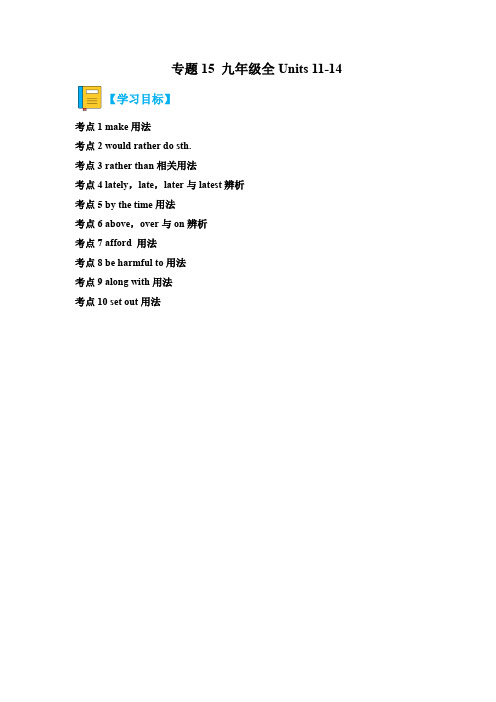
专题15 九年级全Units 11-14【学习目标】考点1 make用法考点2 would rather do sth.考点3 rather than相关用法考点4 lately,late,later与latest辨析考点5 by the time用法考点6 above,over与on辨析考点7 afford 用法考点8 be harmful to用法考点9 along with用法考点10 set out用法【考点聚焦】考点1 make用法(九年级Unit11 P81)Sad movies make me cry.悲伤的电影让我哭泣。
【点拨】make 意为“使得;使变得;使成为”时,常见用法如下:(1)make sb./sth.+形容词使某人或某物……The news made him happy.这个消息使他很高兴。
(2)make sb./sth.+名词使某人/某物成为……Do you think we can make our school a green school?你认为我们能使学校成为绿色学校吗?(3)make sb. do sth. 使某人做某事Nothing will make me change my mind.什么也改变不了我的主意。
(4)make+反身代词+过去分词使……被……She couldn’t make herself heard above the noise of the traffic.车辆噪音很大,她无法让人听到她的声音。
(5)make it+时间把时间约定在……Let’s make it 9 a.m.让我们把时间约定在上午九点吧。
注:(1)make sb.do sth.变为被动语态时要加不定式符号to,即sb.be made to do sth.。
(2)“make it+形容词/名词+不定式/从句”结构中,it 作形式宾语,不定式/从句是真正的宾语。
学以致用1.(2023·山东青岛·统考一模)Why don’t we meet a little earlier? Let’s make ________ at 1:30.A.that B.this C.one D.it【答案】D【详解】句意:我们为什么不早点见面呢?让我们约定在1点30分。
2021年牛津英语译林版九年级中考复习英语阅读强化训练 15(含答案)

牛津英语译林版九年级英语阅读强化训练15一、完形填空I never saw my father come home from work late or ill, nor did I ever see my father take a “night out with the boys”. He had no ___1___ but just took care of his family.For 22 years, since I left home for college, my father had called me every Sunday at 9:00 a. m. He was always ___2___ in my life how my family was going. The ___3___ even came when he and my mother were in Australia, England or Florida.Nine years ago, I bought my first house. My father, 67 years old, spent eight hours a day for three days, ___4___ my house. He would not allow me to ___5___ anyone else to have it done. All he asked was a glass of iced tea, and that I hold a paintbrush for him and talk to him. But I was too ___6___ with work, and I could not spend the time holding the paintbrush, or talking to my father.Five years ago, my 71-year-old father ___7___ five hours putting together a swing set for my daughter. Again, all he asked was that I could get him a glass of ___8___ tea and talk to him. But again, I had laundry to do and the house to ___9___ .The morning on Sunday, January 18, 2015, my father telephoned me as usual. This time he ___10___ to have forgotten some things we had discussed the week before. I had to get to church, so I cut the ___11___ short.The call came at 4:40 a. m. which said my father was sent to hospital in Florida. I got on a plane ___12___ . I vowed that when I arrived, I would ___13___ for the lost time, for I owed him a nice long talk.I arrived in Florida at 1:00 a. m. , but my father passed away at 9:12 p. m. This time it was he who did not have time to ___14___ , or time to wait for me.In the years ___15___ his death I have learnt much about my father, and even more about every single day.1. A. money B. sleep C. hobbies D. freedom2. A. interested B. surprised C. excited D. confused3. A. emails B. calls C. letters D. messages4. A. repairing B. keeping C. building D. painting5. A. show B. pay C. explain D. teach6. A. busy B. bored C. pleased D. angry7. A. used B. wasted C. spent D. took8. A. green B. hot C. black D. iced9. A. clean B. build C. repair D. buy10. A. happened B. decided C. proved D. seemed11. A. introduction B. conversation C. meeting D. interview12. A. carelessly B. rarely C. fluently D. immediately13. A. set up B. hang up C. makeup D. lift up14. A. call B. meet C. talk D. work15. A. during B. since C. before D. until二、阅读理解AA. On foot.B. By car.C. By bike.D. By bus.2. Which of the following is TRUE about Ted and Peter?A. They are brothers.B. They look alike.C. They are classmates.D. They are both shy.3. On Ted’s web page, we can see photos of his ______ .A. familyB. roomC. favourite starsD. tennis team4. How many hobbies are mentioned on Ted Smith’s web page?A. Three.B. Four, oC. Five.D. Six.5. From Ted Smith’s web page, we know ______ .A. Ted is a boy with brown hair and blue eyesB. Ted lives in an apartment at the city centreC. Ted’s room is always in a messD. Ted likes horror movies bestBBy converting leftover cooking oil into fuel for vehicles, Shanghai has made big steps in developing the circular economy.The recycled waste fuel, called B5 biodiesel, is a biofuel mixture consisting of 5 per cent biodiesel, which is made from thrown-away oil from restaurants and sewer pipes, and 95 per cent petroleum diesel fuel.B5 biodiesel produces 10 per cent less heavy metal substances and fine particulate matter, and 80 per cent less nitric oxide emissions compared to the exhaust from ordinary diesel. It first entered the fuel market in Shanghai in September 2013 when buses from a bus company hit the road in a trial project. An examination of the vehicles running on B5 biodiesel conducted by Shanghai’s Tongji University showed that the emission standards from the vehicles had improved notably and no malfunctions had been reported.In May 2019, buses from Shanghai Jiushi officially started running on biodiesel. By the end of 2020, the bus company had used up 50. 85 million litres of B5 biodiesel. Over the past year or more, all bus parking lots under the bus company have adopted B5 biodiesel, using up more than 20 000 tonnes of the fuel. By the end of 2020, the qualification rate of B5 biodiesel was 100 per cent, as showed by examinations carried out by national and municipal quality supervision departments.It took Shanghai 10 years to finally introduce the biodiesel into the market. As a megacity, Shanghai produces more than 30 000 tonnes of discarded kitchen oil each year, while there are 18 recycling companies in the city that refine the gutter oil for production of B5 biodiesel. In 2013 and 2018, the city issued management guidelines to encourage recycling, transportation and processing of discarded cooking oil Shanghai demanded that recycling businesses purchase discarded cooking oil at a price of no less than 3 600 yuan per tonne. In addition, italso provides a subsidy up to 0.24 yuan per litre of B5 biodiesel for oil companies.Now, the fuel is being sold at 5.72 yuan per litre compared with 6.02 yuan for standard diesel. Shanghai’s environmental sanitation department, for instance, could save 100 000 yuan in costs in a year from 30 sanitary vehicles running on biodiesel rather than on standard diesel.1. According to the passage, what does Shanghai do in developing the circular economy?A. Shanghai changes discarded oil into biodiesel.B. Shanghai controls the use of leftover cooking oil.C. Restaurants recycle leftover cooking oil.D. Shanghai reuses 95% of the leftover cooking oil.2. What’s the main idea of Paragraph 3?A. It is more difficult to produce B5 biodiesel than ordinary diesel.B. B5 biodiesel is easier to produce heavy metal substances compared to ordinary diesel.C. B5 biodiesel is better for the environment than ordinary diesel.D. Ordinary diesel is better for the environment than B5 biodiesel.3. Why did Shanghai issue management guidelines in 2013 and 2018?A. To introduce B5 biodiesel into the market in a short time.B. To encourage and carry forward the leftover oil recycling project.C. In order to set the standards for the B5 biodiesel production.D. In order to ask more companies to refine gutter oil for B5 biodiesel.4. What does the underlined word”purchase” mean in the passage?A. Produce.B. Create.C. Collect.D. Buy.5. What can we infer from the passage?A. There will be no leftover oil in Shanghai.B. B5 biodiesel is helpful to the circular economy.C. B5 biodiesel makes vehicles run much faster.D. Gutter oil recycling companies earn more.CHave you ever heard of character amnesia? Amnesia refers to a condition where someone loses all or most of his or her memory. The word may be too strong to use. With character amnesia, however, it means people have forgotten to put the correct stroke (笔画) in a character or have forgotten the character completely.Character amnesia is partly caused by the popularity of electronic communication. Today, most people write using computers or other electronic devices. These devices all have input software. You can easily type in a character even if you don’t know how to form it.Back in 2013, CCTV held an interesting TV contest. Contestants were given a word and then asked to write it on a screen. Some of them had a hard time writing such common words as “癞蛤蟆” and “打喷嚏”. The audience at home were encouraged to try writing these words at the same time. The contest showed how widespread character amnesia had become. It led much discussion. The audience felt surprised. For teachers, however, it was just old news.Su Yunsheng has taught Chinese for more than twenty years. She says, “In recent years, character amnesia has become more and more common among students. I often see students write words incorrectly. The popularity of electronic devices is a major reason.” Su is not the only one complaining. Many experts think not being able to write characters correctly threatens China’s cultural heritage(遗产).“It will take a lot of effort to protect our Chinese characters. It is the same way in which they try to protect these old hutongs,” said Zhu Linfei, a Beijing graduate student, referring to the traditional Beijing roads. Zhu, who was touring the old bookstores of Liulichang with her classmates to buy calligraphy (书法) books, said that she had already forgotten about 20% of the characters she knew in high school. “But it’s not such a big problem,” she said. “If I don’t know a character, I take out my cellphone to check.” But Zhu Linfei is mistaken. It is a big problem that she cannot write 20% of the characters she knew just 5 or 6 years earlier. By relying on her cellphoneto check those characters she can’t recall, that percentage will increase with each passing year. And, every time Zhu Linfei has to stop to take out her cellphone to ask for help to remind herself how to write a character, she is wasting time, and that in itself is a problem.Written Chinese requires a good memory and a lot of hard work. But Chinese characters are a great cultural achievement, Chinese people should be proud of it. It will be a pity if we lose that heritage someday. The threat is nothing to sneeze at!1. If you have character amnesia, you probably ______ .A. cannot write any Chinese charactersB. have lost all or most of your memoryC. have to check some characters on your computerD. don’t know how to write some characters correctly2. From the interesting CCTV contest in 2013, we can infer many of us ______ .A. have character amnesiaB. lose interest in Chinese charactersC. rely on electronic devices to helpD. start to study hard at Chinese characters3. Which of the following about Su Yunsheng is WRONG?A. She asks her students not to write by using computers.B. She has been a Chinese teacher for more than 20 years.C. She has seen many students suffer from character amnesia.D. She thinks character amnesia is mainly caused by electronic devices.4. By writing this passage, the writer probably wants to ______ .A. explore the causes of character amnesiaB. advise people not to write by using electronic devicesC. ask people to pay attention to the threat of character amnesiaD. tell readers the difference between amnesia and character amnesia5. What’s the best title for the passage?A. The benefit of studying ChineseB. The threat of character amnesiaC. Writing Chinese characters correctlyD. Protecting Chinese characters activelyDCurtis Whitson knew the waterfall was coming. He’d rafted down the Arroyo Seco, a river in central California before. He thought he would jump out of his raft into the shallow water, raft down the rocks on either side of the falls, and continue on his way, as he had on last trip.But this year was different. Heavy snow and spring rains had turned the usually manageable falls into something wild. Whitson went rafting with his girlfriend, Krystal Ramirez, and his 13 year-old son, Hunter. As they reached the falls late in the afternoon, Whitson could tell from the increasing water that they were in serious trouble. There was no way they’d be able to raft down the rocks as planned.They could walk to the shore, but would anyone find them there? They had no cell service, and they hadn’t seen a single person in the past three days. And Whitson knew that they’d be sharing the ground there with snakes and mountain lions.As he thought what to do, Whitson hit on a bit of luck he heard voices coming from the other side of the falls, He shouted, but the sound of the rushing water drowned him out. “We have to give these people a message,” Whitson thought. He got a stick and pulled out his pocket knife to carve “Help” on it. Then he tied a rope to it so the people would know it wasn’t just any stick. He tried throwing it over the falls, but it floated away in the wrong direction.“We’ve got to do something!” Whitson shouted to his son. “Have we got anything else?”Then he saw his green water bottle. Whitson took it and carved “Help!” on it. Ramirez also reminded him that he had a pen and paper, which she ‘d brought to play games with, in his backpack.Whitson knew it was a long shot, But he wrote “We are kept here at the waterfall. Help us please.” and put the note into the bottle. This time, his throw over the waterfall was perfect.It took 30 minutes to get back upstream to the beach where they’d had lunch. They made a fire and set up a tent. They were afraid that nobody could find their message in a bottle, so they spelled out SOS in white rocks, which they set on the blue tarp. As the evening wore on, they placed a headlamp with a flashing light on a ledge so that the SOS could be seen from overhead.By about 10:30 p. m. , they decided they probably weren’t going to get rescued that night, so they pulled out their sleeping bags. Before getting in, Ramirez made the fire to keep the mountain lions away.Then, just after midnight, they heard a plane flying above them. Whitson turned to his son and started shaking him. “They re here!” he said. Whitson ran over to the headlamp and started flashing it at the plane. He, Ramirez, and Hunter were waving and shouting when they heard the magic words, “This is Search and Rescue. You have been found.”At this time, the three knew that they were really rescued. It was amazing!文章选自美国著名杂志《读者文摘》(Reader’s Digest)1. From the second paragraph, we mainly know that ______ .A. they were in serious troubleB. there was heavy snow and rainC. the three persons were raftingD. they could raft down the rocks2. To get these people a message, Whitson ______ at first.A. put the note into the bottle and threw it over the fallsB. threw a stick with the word”Help” on it over the fallsC. placed a headlamp with a flashing light on a ledgeD. called 911 and asked them to save them with a plane3. They placed a headlamp with a flashing light on a ledge ______ .A. to keep snakes and lions awayB. to read something with the lightC. to help make a fire to get warmD. to let someone see SOS from overhead4. Which of the following is the CORRECT order according to the story?a. He tried to throw the stick over the falls.b. He put the note into the bottle and threw it.c. They heard a plane were flying above them.d. He heard voices coming from the other side.e. They got to the beach where they had lunch.A. d-b-a-c-eB. b-a-c-e-dC. d-a-b-e-cD. e-a-c-d-b5. What is the ending of the story?A. The three persons were saved.B. The plane didn’t find them.C. The three persons went on their rafting.D. The three persons didn’t hear the plane.三、任务型阅读AOne of the most common questions I am asked is whether, when, and how to follow up after a job interview. Following up in some way is necessary. Yes, you can get a job without it, but if you compete with other top candidates (候选人), following up can sometimes help you when the other candidates don’t. Here’s how to follow up well:Send a thank-you note right away.Email is fine for this and has the advantage of arriving faster, but handwritten notes are still enjoyed. And if there are many interviews, send a thank you note each time.Find out their timeline. Hopefully, you asked about their timeline in the interview itself, but if you didn’t, follow up within a week to strengthen your interest and politely ask what they expect their timeline for a decision to be.Be patient. Commonly, job seekers (求职者) are too worried about the result. You needn’t look worried to express your interest in the job or check in to ask about the timeline.Don’t be nervous if you don’t her from them at once. The hiring process (招聘流程) often takes longer than a candidate would like. Maybe the decision makers are out of town. If you miss the time they told you to hear something, it’s unnecessary to be nervous. Hiring often ends up taking longer than expected. Just politely follow up, explain you re very interested but understand that hiring will take time, and ask if they have the latest timeline.A young lady was driving a family car home with her father when they were caught in a heavy storm. The young lady was a little afraid and asked her father, “What should I do, stop or keep driving?”Her father said, “Keep driving.”After driving a few kilometres, the storm was becoming heavier and heavier. The young lady noticed that some cars and big transport trucks were pulling over on the side of the road. The young lady asked her father again if they should stop. But her father said nothing. So, she had to keep on driving.Ten minutes later, the storm started to become small and she could see a little more clearly. After several kilometres, she drove out of the storm. Moreover, the sun came out and the road ahead was dry.Her father told her to stop and get out of the car. “But why now, Father?” she asked in surprise.Her father said, “When you get out, you can look back at all the people in cars and big trucks that gave up and they are still in the storm. Now, your storm is over because you didn’t give up.”If you keep going, soon your “personal storms” will be over. The sun will shine on you again and the road ahead will be dry and clear. So, never give up and keep moving.根据短文内容, 回答下列问题。
15. 部编英语一轮复习九年级(全) Units 5~6
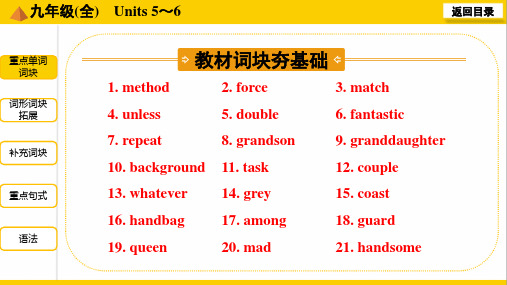
重点句式
语法
33. in place 35. in the dark 37. at the same time 39. a washing machine 41. even if 43. one of 45. over and over again 47. over and over again
考点5
My friend Mike suggested ___g_o_i_n_g_f_i_sh_i_n_g___ this weekend.
九年级(全) Units 5~6
返回目录
考点1
考点 2 What do you think of soap operas?你认为肥
考点2
皂剧怎么样?(Unit 6 P40)
考点5
九年级(全) Units 5~6
返回目录
考点1
考点2
(2)回答时,多阐明自己的看法或表明自己喜欢的程度。
常用到:主语 + love(s)/like(s)/don’t(doesn’t)like/can’t
考点3
stand+宾语,或者Pretty good./It’s fantastic/wonderful.
【考点精讲】What do/does sb. think of...?句型(2016.79)
考点3
(1)此句型意为“某人认为……怎么样?”。该句型相当于
考点4
How do/does sb. like...?和How do/does sb. feel about...?
用于询问某人对某人/事物的观点、看法。
返回目录
考点1
5. —What do you think of the program?
考点2
中考英语复习之九年级第十一单元至十五单元
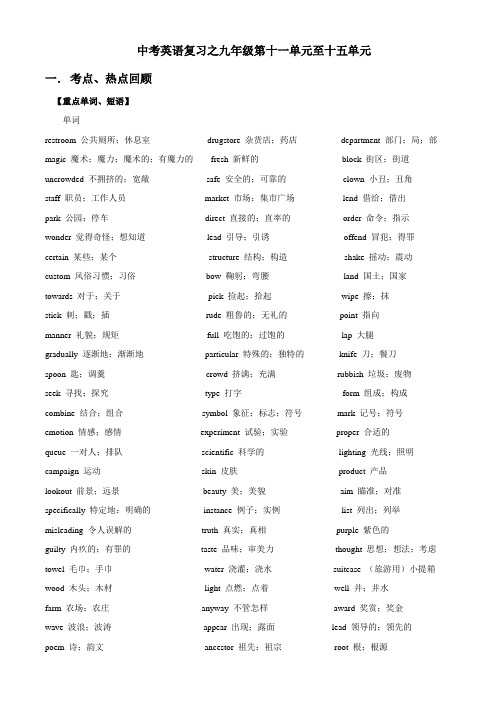
中考英语复习之九年级第十一单元至十五单元一.考点、热点回顾【重点单词、短语】单词restroom 公共厕所;休息室drugstore 杂货店;药店department 部门;局;部magic 魔术;魔力;魔术的;有魔力的fresh 新鲜的block 街区;街道uncrowded 不拥挤的;宽敞safe 安全的;可靠的clown 小丑;丑角staff 职员;工作人员market 市场;集市广场lend 借给;借出park 公园;停车direct 直接的;直率的order 命令;指示wonder 觉得奇怪;想知道lead 引导;引诱offend 冒犯;得罪certain 某些;某个structure 结构;构造shake 摇动;震动custom 风俗习惯;习俗bow 鞠躬;弯腰land 国土;国家towards 对于;关于pick 捡起;拾起wipe 擦;抹stick 刺;戳;插rude 粗鲁的;无礼的point 指向manner 礼貌;规矩full 吃饱的;过饱的lap 大腿gradually 逐渐地;渐渐地particular 特殊的;独特的knife 刀;餐刀spoon 匙;调羹crowd 挤满;充满rubbish 垃圾;废物seek 寻找;探究type 打字form 组成;构成combine 结合;组合symbol 象征;标志;符号mark 记号;符号emotion 情感;感情experiment 试验;实验proper 合适的queue 一对人;排队scientific 科学的lighting 光线;照明campaign 运动skin 皮肤product 产品lookout 前景;远景beauty 美;美貌aim 瞄准;对准specifically 特定地;明确的instance 例子;实例list 列出;列举misleading 令人误解的truth 真实;真相purple 紫色的guilty 内疚的;有罪的taste 品味;审美力thought 思想;想法;考虑towel 毛巾;手巾water 浇灌;浇水suitcase (旅游用)小提箱wood 木头;木材light 点燃;点着well 井;井水farm 农场;农庄anyway 不管怎样award 奖赏;奖金wave 波浪;波涛appear 出现;露面lead 领导的;领先的poem 诗;韵文ancestor 祖先;祖宗root 根;根源overseas 海外的;国外的government 政府strongly 坚定的;坚决的purpose 目的;意图step 步;脚步;步骤enormous 巨大的;庞大的playful 顽皮的aggressive 侵犯的;挑衅的habitat 生长环境underwater 在水下的weigh 称;称…重量discover 发现;发觉polluted 被污染的suitable 适合的;适宜的tiny 极小的;微小的disgusted 厌恶的;憎恶的expression 词语;表达方式recycle 再循环;回收利用pull 拉;拖;拔roof 屋顶;房顶;顶society 社团;社会president 总统;总裁inspiration 灵感spare 多余的;空闲的material 材料;物质business 商业;生意proud 自豪的;骄傲的短语与….不同…依靠,依顺,取决于打扮(成)上交为了有点儿,有几分挨着,紧靠着向右拐有点儿,稍微在吃饭以…开始忍不住/禁不住做邀请某人做某事相互做鬼脸握手用某人自己的……. 属于某人自己的独立地本应该做但实际没有做反对不同意某人的意见惊讶,惊奇使某人惊讶的是力劝某人做某事听说,听到收到…来信来自减肥增肥在社会中在某人的业余时间里瞄准,针对把A同B作比较把A比作B 例如赞成与反对有时,偶尔离开,走开在进行中清除,把…打扫干净清理,打扫干净买东西购物过会儿与某人通话好运气马上环顾四周照顾检查看起来像查找幸亏为…感谢【词语辨析】1.decidedecide vi. 决定+to do sth : We all decide to go+that 从句:I decided that I would tell him about it.vt. 决定、下决心.+(带疑问词的)不定式:+ 名词/代词: You can’t decide anything now.decide to do 决定做某事= make a decision to do sth = make up one’s mind to do sth.decide not to do sth. 决定不做某事表示使某人作出决定时,可用不定式充当宾语补足语。
人教版九年级英语第十四、十五单元复习PPT教学课件
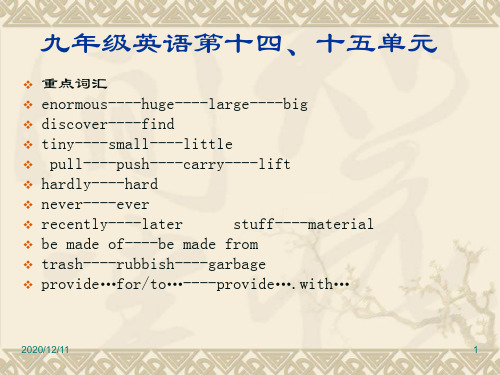
❖ (1)be made of意为“由…原材料制成”,主语为制成品, 而且能看出原材料,of后面接表示原材料的名词。如:This jacket is made of cotton.这件上衣是棉花做的。
❖ (2)be made in表示某一产品在某地生产或制造,in后面跟 表示地点的名词。
find表示“找到”,强调找的结果。3)find out
表示“找出,查明”之意,指经过调查,观察,
询问或研究等手段发现或找到。4)search是指对
某一处所,人身进行搜查或指寻找想找的人或物,
后面可以接介词for,但比look for语气更强些。
2020/12/11
7
PPT教学课件
谢谢观看
Thank You For Watching
❖ 2)be proud to do sth表骄傲/自豪去做某事”
❖ 3)be the pride of表示“是...的骄傲”
❖ 2.be suitable for适合的,恰当的
❖ 3.look for, find , find out, search: look for表示“寻找”,强调找的动作或过程。2)
❖ (3)In the past three years we have learned two thousand English words.
❖ 3年来我们学了2000个英语单词。
❖ 难点:用于肯定句时,和以上短语连用的动词必须是延续性动作。
❖ 如:He has had(而不是bought)the book for three years.他 已经买这本书三年了。
❖ I can’t hear clearly. Would you please turn the tape up?
(百色专版)九年级中考英语一轮复习分类汇编:专题15复合句

专题十五 复合句 百色五年中考命题规律及趋势近五年百色中考考情分析2019年百色中考命题预测年份 考查角度 考查重点 题号 分值 预计2019年百色中考对复合句的考查仍是重点。
倾向于考查宾语从句语序、定语从句关系词的用法。
考查形式主要以选择填空和完形填空为主。
考查的小题数约2—3道。
2019 / / / /2019定语从句的用法 考查关系代词who 作主语的用法35 1宾语从句的用法 考查if 引导的宾语从句的语序39 12019 定语从句的用法 考查关系代词whose作定语的用法38 12019 宾语从句的用法 考查where 引导的宾语从句的时态和语序 37 12019 定语从句的用法 考查关系代词that作宾语的用法38 1百色中考语法突破宾语从句命题点用法例句连接词that 在从句中作宾语时可省略,作主语时不能省略The teacher often says(that) you are cute.老师经常说你很可爱。
what ,when ,where ,how ,whatever ,whenever ,wherever ,who ,whom ,whose 等特殊疑问词作连接词Please tell me how you go to school.请告诉我你是怎么去学校的。
表示“是否”时,连接词用whether/ifCould you tell meif/whether it snows inwinter i n Australia ?你能告诉我澳大利亚的冬天是否下雪吗?语序 从句一律用陈述语序,即主语+谓语 时态主句为现在时,从句根据实际情况使用相应时态I hear Joe will leave for Beijing.我听说乔将要去北京了。
主句为过去时,从句使用过去时的某种形式Kate said she was watching TV this time yesterday.凯特说昨天的这个时候她正在看电视。
人教版中考英语一轮教程基础知识复习 第十五课时九年级 Unit 1 ~Unit 2

第十五课时九年级Unit 1 ~Unit 201考点扫描知识清单化2.词汇过关Ⅰ.根据句意和所给的汉语或首字母提示拼写单词并完成句子。
(2) 有些动词短语中的to与pay attention to一样,也是介词。
参考答案:第十五课时九年级Unit 1~Unit 2重点词汇1.conversation2.aloud3.pronunciation4.sentence5.patient6.expression7.discover8.secret9.repeat10.note11.pronounce12.increase13.speed14.born15.ability16.create17.active18.review19.knowledge20.wiselyy25.admire26.tie27.treat28.lie29.novel30.dead31.punish32.warn33.present34.warmth35.spread重点句型1.How;by;with a group2.What about3.too hard to understand4.discovered;the secret to5.make mistakes in6.whether;a good time to visit7.What fun8.that;the hottest month词汇过关Ⅰ.1.conversation2.aloud3.sentence4.relatives5.ties6.repeat 7.pronunciation8.expression9.notes10.novelsⅡ.11.physical12.working13.patience14.having15.to work16.ability17.dead 18.wisely19.activities20.lyingⅢ.21.end id out23.put on24.take notes25.making mistakes26.practice conversations with27.spread;around28.over and over again29.pay attention to30.connect;with考点透视❶Ⅰ.1—3AACⅡ.4.How does5.by working6.How does;relax❷Ⅰ.1—3CBDⅡ.4.when to go5.to do6.where to❸Ⅰ.1—4CCADⅡ.5.pay attention to6.pay attention to❹Ⅰ.1—5BBBCBⅡ.6.Look,what heavy rain!7.What clever8.How beautiful考点辨析❺Ⅰ.1—3DBCⅡ.4.invention5.discovery❻Ⅰ.1—4AABAⅡid8.lied整合集训Ⅰ.1—5CDADA6—10DAACDⅡ.11—15CBDBD16—20BACBAⅢ.21—25BCBADⅣ.A)26.repeat 27.knowledge28.creating29.conversation30.activeB)31.expressions32.dead33.has put on34.was born with35.will end upⅤ.36.specific37.Reading38.Studying 39.movies40.improveⅥ.One possible version:Dear Tom,I’m very glad to tell you something about Spring Festival.It’s a traditional festival in China.It comes in winter.It’s time to get new.We usually clean and decorate o ur house carefully before it comes.I always help my mother clean the windows and wash the clothes.We put on chunlian on the door and chuanghua on the window.It’s time to get together.Everyone go home to get together with their family,though someone is far away from home.They must have dinner together on that day.They must visit their relatives and friends and say “Happy new year” to them.When the kids greet their grandparents,they can get money.Yours,Li Lei。
新目标九年级英语Unit15复习

What did you see A: 2___________________________________?
B: We saw a lot of endangered animals, like manatees, pandas, chimpanzees (黑猩猩)and so on.
REUSE You don’t need new bags every time you go to the store. Reuse the old ones---and you had better use cloth bags, not plastic ones. REFUSE Stop buying anything that is over –packaged. Also look for products that come in boxes made of recycled cardboard(硬纸板). RECYCLE People can use cans, newspapers and plastic bottles again. So don’t throw them away. Send them to the recycling center.
* Fill in the chart.
House parts Things made from
The walls old glass bottles used soda cans discarded tiles
1. Who is Amy Winterbourne? 2. Did she win an award? What’s it? 3. What does she do in her spare time?
浙江省2018年中考英语总复习课后练习:第15课 九年级 Units 1—2 讲解篇
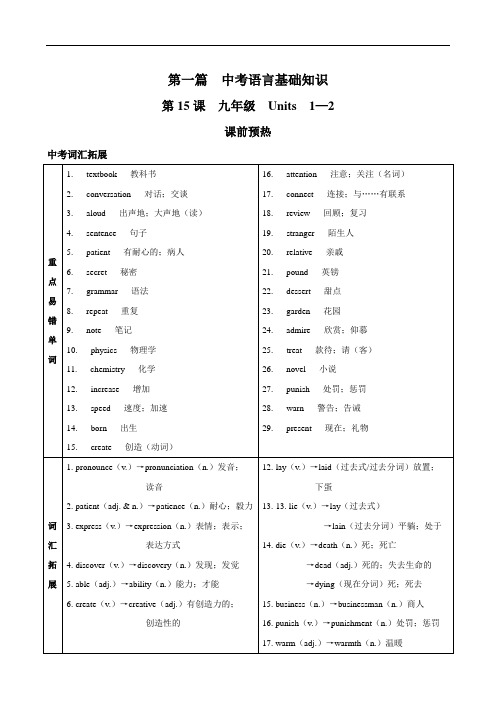
第一篇中考语言基础知识第15课九年级Units 1—2课前预热中考词汇拓展重点易错单词1. textbook 教科书2. conversation 对话;交谈3. aloud 出声地;大声地(读)4. sentence 句子5. patient 有耐心的;病人6. secret 秘密7. grammar 语法8. repeat 重复9. note 笔记10. physics 物理学11. chemistry 化学12. increase 增加13. speed 速度;加速14. born 出生15. create 创造(动词)16. attention 注意;关注(名词)17. connect 连接;与……有联系18. review 回顾;复习19. stranger 陌生人20. relative 亲戚21. pound 英镑22. dessert 甜点23. garden 花园24. admire 欣赏;仰慕25. treat 款待;请(客)26. novel 小说27. punish 处罚;惩罚28. warn 警告;告诫29. present 现在;礼物词汇拓展1.pronounce(v.)→pronunciation(n.)发音;读音2. patient(adj. & n.)→patience(n.)耐心;毅力3. express(v.)→expression(n.)表情;表示;表达方式4. discover(v.)→discovery(n.)发现;发觉5. able(adj.)→ability(n.)能力;才能6. create(v.)→creative(adj.)有创造力的;创造性的y(v.)→laid(过去式/过去分词)放置;下蛋13.13. lie(v.)→lay(过去式)→lain(过去分词)平躺;处于14. die(v.)→death(n.)死;死亡→dead(adj.)死的;失去生命的→dying(现在分词)死;死去15. business(n.)→businessman(n.)商人16. punish(v.)→punishment(n.)处罚;惩罚7. active(adj.)→actively(adv.)活跃地→activity(n.)活动8.connect(v.)→connection(n.)连接;与……有联系9. wise(adj.)→wisely(adv.)明智地;聪明地10. strange(adj.)→stranger(n.)陌生人11. steal(v.)→stole(过去式)→stolen(过去分词)偷;窃取18. spread(v.)→spread(过去式/过去分词)传播;展开;蔓延19. memory(n.)→memorize(v.)记忆20. know(v.)→knowledge(n.)知识21. loud(adj.)→aloud(adv.)喧闹地;大声地;响亮地中考词组短语词组1. pay attention to注意2. lay out摆开;布置3. end up最终成为4. by asking the teacher for help通过向老师求助5. read aloud to practice pronunciation大声朗读来练习发音6.improve one’s speaking skills提高某人说的技能7. too hard to understand spoken English太难而不能理解英语口语8. read word by word一个字一个字地读9. be patient with对……有耐心10. an English movie called...一部名叫……的英文电影11. It’s a piece of cake. 小事一桩。
2013-2014学年九年级下学期英语复习题(第15周)十五、综合模拟
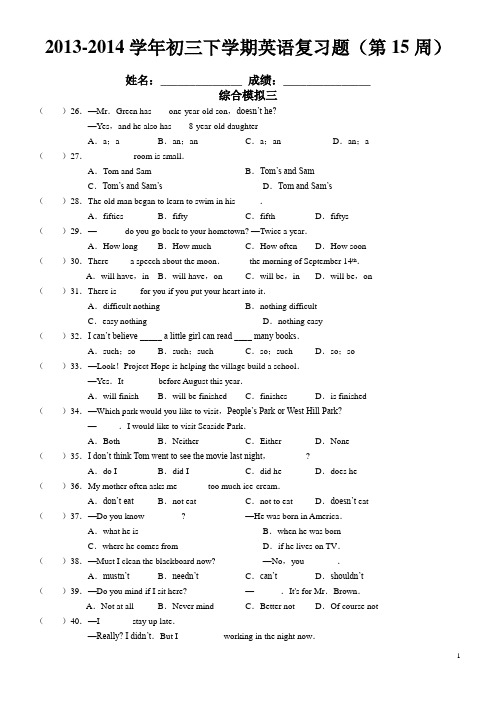
2013-2014学年初三下学期英语复习题(第15周)姓名:______________ 成绩:_______________综合模拟三()26.—Mr.Green has ___ one-year-old son,doesn‘t he?—Yes,and he also has ___ 8-year-old daughterA.a;a B.an;an C.a;an D.an;a()27.__________ room is small.A.Tom and Sam B.Tom‘s and SamC.Tom‘s and Sam‘s D.Tom and Sam‘s()28.The old man began to learn to swim in his _____.A.fifties B.fifty C.fifth D.fiftys()29.—______ do you go back to your hometown? —Twice a year.A.How long B.How much C.How often D.How soon()30.There ____ a speech about the moon._____ the morning of September 14th.A.will have,in B.will have,on C.will be,in D.will be,on()31.There is _____for you if you put your heart into it.A.difficult nothing B.nothing difficultC.easy nothing D.nothing easy()32.I can‘t believe _____ a little girl can read ____ many books.A.such;so B.such;such C.so;such D.so;so()33.—Look!Project Hope is helping the village build a school.—Yes.It _______ before August this year.A.will finish B.will be finished C.finishes D.is finished()34.—Which park would you like to visit,People‘s Park or West Hill Park?—_____.I would like to visit Seaside Park.A.Both B.Neither C.Either D.None()35.I don‘t think Tom went to see the movie last night,_______?A.do I B.did I C.did he D.does he()36.My mother often asks me ______ too much ice-cream.A.don‘t eat B.not eat C.not to eat D.doesn‘t eat()37.—Do you know ________? —He was born in America.A.what he is B.when he was bornC.where he comes from D.if he lives on TV.()38.—Must I clean the blackboard now? —No,you _______.A.mustn‘t B.needn‘t C.can‘t D.shouldn‘t()39.—Do you mind if I sit here? —______.It's for Mr.Brown.A.Not at all B.Never mind C.Better not D.Of course not()40.—I_______ stay up late.—Really? I didn‘t .But I __________working in the night now . A .used to ,used to B .was used to ,used to C .used to ,am used toD .was used to ,use to( )41.—It‘s very nice ______you to help me with my English .—Not at all .I think it is important ____us to help each other . A .of ,ofB .for ,ofC .of ,for( )42.—Have you ______ spoken to an American ?—No ,I ‗ve _________ met a foreigner . A .already ;never B .ever ;neverC .yet ;alreadyD .ever ;ever( )43.They don‘t know which room ________.A .to liveB .for livingC .to live inD .to living( )44._______ strong the wind is !I‘m afraid we can‘t go to the sea today .A .WhatB .SoC .HowD .Such( )45.—I‘m going to take part in the piano contest next week .—_____A .Really? Congratulations !B .Good luck !C .Nice work !D .You‘re really go od .Someone says ,―Time is money‖,but I think time is 46 important than money .Why? Because when money is spent ,we can get it back .However ,when time is 47 ,it‘ll never 48 .That is49 we must not waste time .It goes without saying that the 50 is usually limited .Ever a second is very important .We should make full use of our time to 51 useful .But it is a pity that there are a lot of people who do not know the importance of the time .They spent their limited time smoking ,drinking and 52 .They do not know that wasting time means wasting part of their own 53 .In a word ,we should save time .We shouldn‘t 54 today‘s work for tomorrow .Remember we have no time to 55 .( )46.A .much B .lessC .mush lessD .even more ( )47.A .cost B .boughtC .goneD .finished ( )48.A .returnB .carryC .takeD .bring ( )49.A .whatB .thatC .becauseD .why ( )50.A .moneyB .timeC .dayD .food ( )51.A .nothing B .something C .anythingD .everything( )52.A .readingB .writingC .playingD .working ( )53.A .time B .food C .money D .life ( )54.A .stop B .leave C .let D .give( )55.A .loseB .saveC .spendD .take得 分 评卷人三、完形填空。
人教版中考英语一轮复习第十五讲 九年级Units 3-4教学设计
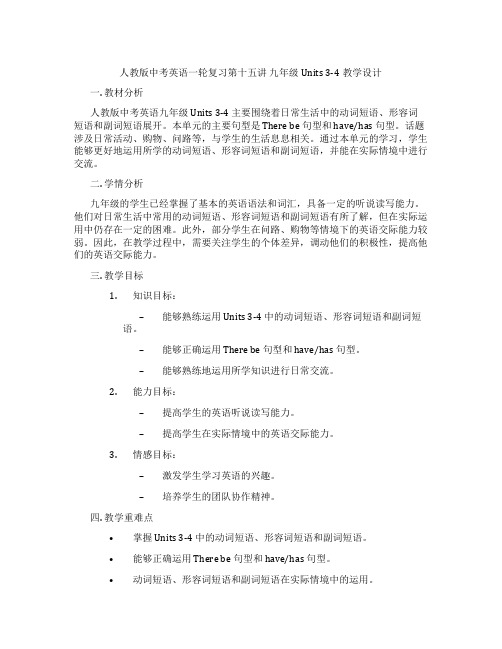
人教版中考英语一轮复习第十五讲九年级Units 3-4教学设计一. 教材分析人教版中考英语九年级 Units 3-4 主要围绕着日常生活中的动词短语、形容词短语和副词短语展开。
本单元的主要句型是 There be 句型和 have/has 句型。
话题涉及日常活动、购物、问路等,与学生的生活息息相关。
通过本单元的学习,学生能够更好地运用所学的动词短语、形容词短语和副词短语,并能在实际情境中进行交流。
二. 学情分析九年级的学生已经掌握了基本的英语语法和词汇,具备一定的听说读写能力。
他们对日常生活中常用的动词短语、形容词短语和副词短语有所了解,但在实际运用中仍存在一定的困难。
此外,部分学生在问路、购物等情境下的英语交际能力较弱。
因此,在教学过程中,需要关注学生的个体差异,调动他们的积极性,提高他们的英语交际能力。
三. 教学目标1.知识目标:–能够熟练运用 Units 3-4 中的动词短语、形容词短语和副词短语。
–能够正确运用 There be 句型和 have/has 句型。
–能够熟练地运用所学知识进行日常交流。
2.能力目标:–提高学生的英语听说读写能力。
–提高学生在实际情境中的英语交际能力。
3.情感目标:–激发学生学习英语的兴趣。
–培养学生的团队协作精神。
四. 教学重难点•掌握 Units 3-4 中的动词短语、形容词短语和副词短语。
•能够正确运用 There be 句型和 have/has 句型。
•动词短语、形容词短语和副词短语在实际情境中的运用。
•复杂句型的运用。
五. 教学方法1.任务型教学法:通过设置各种真实的任务,让学生在完成任务的过程中运用所学知识。
2.情境教学法:创设各种日常生活中的情境,让学生在实际情境中进行英语交际。
3.小组合作学习:引导学生进行小组讨论、合作完成任务,提高他们的团队协作能力。
六. 教学准备1.教学材料:教材、多媒体课件、教案、练习题等。
2.教学设备:投影仪、计算机、音响等。
九年级英语全册期末专题复习单项选择新版人教新目标版

单项选择第一组(C)1.(2024湖南益阳中考改编)I read ________ unusual story last night.________ story is about Dr. Zhong Nanshan.A.an; A B.a; The C.an; The D.a; A(A)2.(2024·天津)—In China, we use red paper for hongbao because red means good luck.—That's interesting! I want to know all the Chinese ________.A.traditions B.sentencesC.notices D.problems(D)3.(2024·辽宁抚顺)Developing good reading habits can ________ our reading speed.A.review B.receive C.spread D.increase(C)4.(2024·山东日照)It's necessary for kids to learn to spend money ________.A.easily B.cheaply C.wisely D.quickly(C)5.(2024·江苏南京)We still know little about the Moon ________ men have landed on it.A.if B.since C.although D.because(C)6.(2024·贵州黔东南)There is ________ milk in the fridge, is there?A.few B.a few C.little D.a little(A)7.(2024·江苏苏州)—Wow, you've made so much progress in drawing.—Thanks.I ________ two online courses this winter holiday.A.took B.will takeC.take D.was taking(A)8.(2024·山东青岛)Teachers expect all their students ________ progress day by day.A.to make B.make C.to take D.take(C)9.(2024四川广元中考改编)—What should we pay attention to ________ mistakes during the exams?—Some details.A.avoiding making B.avoid to makeC.to avoid making D.avoiding to make(B)10.(2024·湖北鄂州)Although the man is in his eighties,he grows vegetables ________ in his garden.A.in public B.in personC.in silence D.in fact(A)11.(2024山西中考改编)—I am a little nervous every time I take exams.—Don't worry.Just try your best.________, grades are not everything.A.After all B.As a resultC.In the same way D.In a word(C)12.(2024·湖北鄂州)—I'm proud of Ezhou, our homeland.—So am I. It is becoming ________.A.more and more beautifullyB.more beautiful and beautifulC.more and more beautifulD.more beautifully and beautifully(A)13.(2024海南中考改编)President Xi Jinping encourages all Chinese people to plant trees ________ our country can be greener and more beautiful.A.so that B.as long asC.even though D.as if(D)14.(2024·江苏连云港)I have some tickets for the football match.I called my friends to see ________.A.where did they buy themB.why they liked to go thereC.when did we go togetherD.whether they'd like to go(C)15.(2024·云南)—Could you please do the dishes?—________. I cut my finger and I'm trying not to get it wet.A.Yes, sureB.No problemC.Sorry, I'm afraid I can'tD.That would be fine其次组(D)1.(2024云南昆明中考改编)A 12yearold boy from Hunan invented a new kind of window because of his ________. The window can prevent children from falling out.A.communication B.celebrationC.hobby D.creativity(D)2.(2024·山东滨州)—Mum, must I be a teacher like you when I grow up.—No, you needn't. You can make your own ________.A.difference B.discussion C.discovery D.decision(A)3.(2024·甘肃天水)—Everyone should stick to his dream.—Yes. A life without a dream is like a bird without ________, which can't fly.A.wings B.water C.clouds D.food(A)4.(2024江苏镇江中考改编)My English teacher is a(n) ________ lady and she often corrects my pronunciation again and again.A.patient B.creativeC.interested D.talented(B)5.(2024·内蒙古包头)The girl used to be shy,but she is ________ getting active in team work and willing to make friends.A.usually B.gradually C.mainly D.seldom(A)6.(2024·云南昆明)Garbagesorting(垃圾分类) encourages people to live ________ life than before. It makes the earth a better place to live in.A.a greener B.the greenestC.a wilder D.the wildest(B)7.(2024·湖北武汉)—Do you need any help?—No, thanks. We ________ a lot of support since last year.A.have offered B.have been offeredC.were offered D.were offering(A)8.(2024·山东青岛)Teachers expect all their students ________ progress day by day.A.to make B.makeC.to take D.take(B)9.(2024·四川遂宁)—I wonder if Sally ________ us prepare for the party.—I'm sure she will if she ________ time.A.helps; will have B.will help; hasC.will help; will have D.helps; has(C)10.(2024·天津)Lang Ping is a symbol of courage and success, and we ________ her.A.come from B.stand forC.take pride in D.get ready for(D)11.(2024·重庆A卷)Another bridge over the Jialing River ________ last year.A.builds B.builtC.is built D.was built(C)12.(2024·江苏扬州)Lucy held her head up like a queen ________ Bill was telling his tale.A.after B.before C.while D.until(B)13.(2024·甘肃天水)—The Whites have ________ Hong Kong.—Oh, really? I have never ________ there before.A.been to; gone B.gone to; beenC.been to; gone to D.gone to; been to(A)14.(2024·江苏徐州)We can ________ the TV. Nobody is watching it.A.turn off B.turn onC.turn up D.turn down(C)15.(2024·山东滨州)—The little boy is only three years old, but he can memorize about 50 poems.—________ talented boy he is!A.How B.How a C.What a D.What第三组(B)1.(2024广东深圳中考改编)—Hey, Alicia! Have you got used to Chinese food?—Yes! But I am still learning to use ________ as a Chinese does.A.forks B.chopsticksC.knives D.scissors(B)2.(2024·江苏盐城)Watching The Legend of Luo Xiaohei is a good ________ to relax when you're tired.A.rule B.choice C.question D.skill(D)3.(2024·云南)Wang Lei is looking forward to ________ the best high school in September.A.refusing B.playing C.reading D.entering(B)4.(2024·江苏苏州)Kunqu Opera is ________ thought to be one of the symbols of Suzhou.Don't miss it during your stay here.A.hardly B.widely C.suddenly D.badly(B)5.(2024海南中考改编)Uncle Liang has a great collection of ________ watches.A.enjoyable B.valuableC.comfortable D.believable(C)6.(2024·江苏无锡)—Hmm, something ________ so good.Is it a cake? Can I try some?—Handmade cookies. Still warm. Here you go!A.feels B.looks C.smells D.tastes(C)7.(2024四川甘孜中考改编)He felt tired, so he stopped ________ a rest under the tree.A.having B.have C.to have D.had(A)8.(2024·北京)—________ you give me a hand?I can't move the box by myself.—No problem.A.Could B.Should C.Must D.Need(C)9.(2024·甘肃天水)We can overcome all the difficulties by ________ together.A.work B.works C.working D.worked(B)10.(2024·青海)—What do you know about the earthquake happened in the morning?—The wounded people ________ to the hospital in time.A.are brought B.were broughtC.will be brought D.have been brought(D)11.Dad ________ TV when it began to rain yesterday.A.watches B.watchedC.is watching D.was watching(D)12.(2024·山东滨州)—Do you know Li Ziqi?—Of course.She is a beautiful girl ________ has made many videos to show a traditional Chinese way of life.A.whose B.where C.which D.who(B)13.(2024·江苏淮安)My brother often ________ his spare time to help me with my spoken English.A.puts up B.gives upC.opens up D.tidies up(B)14.(2024海南中考改编)Many successful businessmen ________ to Hainan to give advice on how to build Hainan Free Trade Port.A.invite B.are invitedC.are inviting D.is invited(C)15.(2024·贵州铜仁)—My English is poor. Could you help me with it?—________.A.Thank you B.Me, tooC.No problem D.See you。
中考复习九年级英语专题复习题型十五情景交际

【解析】选A。考查交际用语。问句句意: 我可以借你 的自行车吗? 故A项“当然, 你能。”符合句意。
三、祝福、祝愿
(1)—Have a gooFra bibliotek day/time! /Have a good journey/trip! 玩得高兴! /旅途愉快! —Thank you. 谢谢你。 (2)Good luck! 祝你好运! (3)Enjoy yourself! 玩得开心!
③—Don’t listen to music in class. — ________ A. Sorry, I won’t. B. No way. C. It’s a pleasure.
【解析】选A。考查情景交际。句意: ——不要在课堂 上听音乐。——抱歉, 我不会了。A项“抱歉, 我不会 了”; B项“决不”; C项“不客气”。根据句意可知A 项符合题意。
④—Jane, your new dress looks very nice on you! — ________ . I like it very much. A. You are welcome B. I don’t think so C. Thanks a lot 答案: C
二、请求、建议和许可 (1)—Let’s go for a walk. 我们去散步吧。 —OK. /Good idea. 好的/好主意。 (2)—Would you like to go out for a walk? 你愿意出去 走走吗? —Yes, I’d love to. /I’d love to, but I’m afraid I have no time. 我乐意去/我想去, 但是恐怕没有时间。
(3)—May I invite you to dinner? 我能邀请你共进晚餐 吗? —Yes. It’s kind/nice of you. 好的。你真好。 (4)—What/How about having a swim? 一起去游泳怎么样? —That would be very nice. 那太好了。
- 1、下载文档前请自行甄别文档内容的完整性,平台不提供额外的编辑、内容补充、找答案等附加服务。
- 2、"仅部分预览"的文档,不可在线预览部分如存在完整性等问题,可反馈申请退款(可完整预览的文档不适用该条件!)。
- 3、如文档侵犯您的权益,请联系客服反馈,我们会尽快为您处理(人工客服工作时间:9:00-18:30)。
初中英语九年级寒假在线课堂专题复习十五(综合4)一、单项选择1. It’s easier to make _________decision than take _________action.A. /, /B. a, anC. a, /D. /, an2. — What happened to her ________ that cold winter evening?—I don’t know, and I’m also curious ________ it.A. /, ofB. on, aboutC. in, aboutD. on, for3. Put your heart into it, ______ you can't learn well.A. andB.butC. orD./4. The policeman is still not sure ______ the young man killed himself or was killed.A. thatB. weatherC. whetherD. if5. —Do you like chatting with your friends on the telephone or mobile phone?—______. I would rather _______ Wechat.A. Either; useB. Neither; useC. Both; to useD. Neither; to use6. — What do you think of the book?— Wonderful. ______ the children ______ their father like to read it.A. Both; andB. Not only; but alsoC. Either; orD. Neither; nor7. How much money has he devoted _______ these poor children return to school?A. helpedB. to helpC. to helpingD. into helping8. —You’re late again, Tom!—Sorry, Mr. Smith. I promise I _______late next time.A. not to beB. not toC. don’t beD. won’t be9. —Oh, my God! I can’t find my math homework.—You are always so careless. Perhaps it ______ at your home again.A. leftB. has leftC. was leftD. had left10. ______ useful advice Mr Friend offered! Now I can get on with my classmates quite well!A. WhatB. What aC. What anD. How11. The burglars ran ______ fast that the policemen could not catch them right at the scene.A. veryB. tooC. soD. such12. —______ will the winter holiday begin? I can’t wait any longer!—______ the school reports are provided.A. How long; UntilB. How long; Not untilC. When; UntilD. When; Not until13. ______ the cinema is near our home, my grandmother hardly watches films there.A. IfB. BecauseC. WhenD. Though14. —The haze(雾霾) weather is so terrible these days, I really don’t know ______.—Maybe people should take more public transports.A. how can we make things betterB. that it does harm to our daily lifeC. what we can do with the problemD. where the air quality is bad for our health15. —I missed the beginning of The V oice of China yesterday evening.—______ But you can watch the replay(重播) tonight.A.I don’t think so.B. Hurry up!C. Try your best!D. What a pity!二、完形填空The Power of Determination (决心)The little country schoolhouse was heated by an old coal stove (火炉). A little boy had the job of coming to school early each day to start the 16 and warm the room before his teacher and his classmates got there.One morning they 17 to find the schoolhouse burning. They dragged (拖) the little boy out of the building more dead than alive. Then he was 18 taken to a nearby county hospital.The doctor told the boy’s mother that 19 the lower part of his body was seriously burnt, he couldn’t use his legs any more. However, the 20 boy made up his mind that he would walk. Unluckily his thin legs 21 hung there, all but lifeless.Finally he returned home from the 22 . Every day his mother would press his little legs, but there was no feeling, no control, 23 . Yet his determination that he would walk was as 24 as ever.When he wasn’t in bed, he would sit in a wheelchair. One sunny day his mother wheeled him out into the yard to get some fresh air. This day, instead of sitting there, he threw himself from the chair and 25 himself across the grass, dragging his 26 behind him.He worked his way to the white fence (栅栏) around the yard. With great effort, he raised himself up on the fence. Then, he began dragging himself along the fence, 27 that he would walk. He started to do this every day. There was nothing he 28 more than to develop life in those legs.In the end, he did stand up. He began to 29 to school, and then to run to school, to run 30 the joy of running. Later in college he made the running team.Still later in Madison Square Garden this determined young man, Dr. Glenn Cunningham, ran the world’s fastest mile!( ) 16. A. fire B. class C. game D. story ( ) 17. A. left B. waited C. arrived D. hid ( ) 18. A. clearly B. quickly C. suddenly D. nearly ( ) 19. A. when B. unless C. before D. because ( ) 20. A. honest B. brave C. worried D. calm ( ) 21. A. just B. also C. once D. ever( ) 22. A. school B. yard C. hospital D. square ( ) 23. A. everything B. anything C. something D. nothing ( ) 24. A. strong B. simple C. strange D. similar ( ) 25. A. climbed B. pulled C. picked D. enjoyed ( ) 26. A. arms B. chair C. legs D. mother ( ) 27. A. believing B. doubting C. promising D. suggesting ( ) 28. A. afforded B. hated C. forgot D. wanted ( ) 29. A. jump B. climb C. walk D. run ( ) 30. A. to B. for C. from D. without三、阅读理解AThe eagle has the longest life of its group. It can reach up to 70 years.But to reach this age, the eagle must make a hard and painful decision.When an eagle reaches near 40, its short sharp beak (喙) becomes bent(弯曲的). Its long and once flexible (灵活的) talons can no longer catchanimals or birds for food. And its old and heavy wings with thick feathers onits body make it difficult to fly.Then, the eagle has only two choices: to die or to go through a painful time of change which needs five months.When the eagle feels weak and is about to die, it goes to a place far away on the top of a mountain and sits on a nest. For a new life, the eagle knocks its beak against a rock until it pulls its beak out. After pulling it out, the eagle waits for a new beak to grow. And then it pulls out its talons and old feathers. It takes the eagle five months to complete its change and get a new life. We can call it its rebirth. So it can live for 30 more years.Like the eagle, we human beings sometimes need to make some changes to get out of our difficulty. In miserable condition, we have to change our ways of life. The changing may be very painful. But sometimes we have to throw off our old habits, memories and traditions. We can’t go on with all our past burdens (重负).( ) 31. Which of the following is TRUE according to the passage?A. If the eagle doesn’t change itself, it will have a new life.B. For a new life, the eagle knocks its talons against a rock.C. The writer’s idea is that we can’t go on with all our past burdens.D. When an eagle reaches near 40, its short sharp beak is still straight.( ) 32. The underlined word “miserable” here probably means ______.A. terribleB. goodC. lonelyD. lucky( ) 33. The best title for the passage can be ______.A. The death of the eagleB. Rebirth of the eagleC. A good and easy decisionD. The living period of the eagleBResearch has shown that music has an important effect on one’s body and psyche (心灵). In fact, there is a growing field of health care known as music therapy, which uses music to treat diseases. Even hospitals are beginning to use music therapy. This is not surprising, as music affects the body and mind in many powerful ways.Research shows that quick music can make a person feel more alert (敏捷的), while slow music can produce a calm, deep thinking state. Also, research has found music can change brainwave activity levels. This can help the brain to change speeds more easily on its own as needed, which means that music can bring lasting benefits (益处) to your state of mind, even after you’ve stopped listening.Breathing and heart rates can also be influenced by music. This can mean slower breathing, slower heart rate. This is why music and music therapy can help reduce the damaging effects of long-term stress, greatly promoting (促进) not only relaxation, but also health.Music can also be used to bring about a more positive state of mind by helping to keepworries away. Music has also been found to bring many other benefits, such as lowering blood pressure and reducing the risk of strokes (中风). It is no surprise that so many people are considering music as an important tool to help the body become or stay healthy.( ) 34. What can we infer about music therapy?A. It is a type of music.B. It is a research about music.C. It is a kind of musical effect on diseases.D. It is the use of music method to help treat diseases.( ) 35. According to the second paragraph, we can know that ______.A. quick music is not good for one’s healthB. music with different speeds has different effectsC. music will have less benefit after one stops listeningD. slow music can help one to think more calmly and slowly( )36. According to the passage, music can help deal with all the following EXCEPT ______.A. strokesB. blood cancerC. nervousnessD. high blood pressure ( ) 37. The reason why music can help deal with stress is that ______.A. it is used by many hospitalsB. it can help change brainwavesC. it does good to breathing and heart ratesD. it can bring a more positive state of mind四、词汇A. 请根据括号中的中文提示、英文释义或句意,写出句中所缺单词,使句子通顺。
